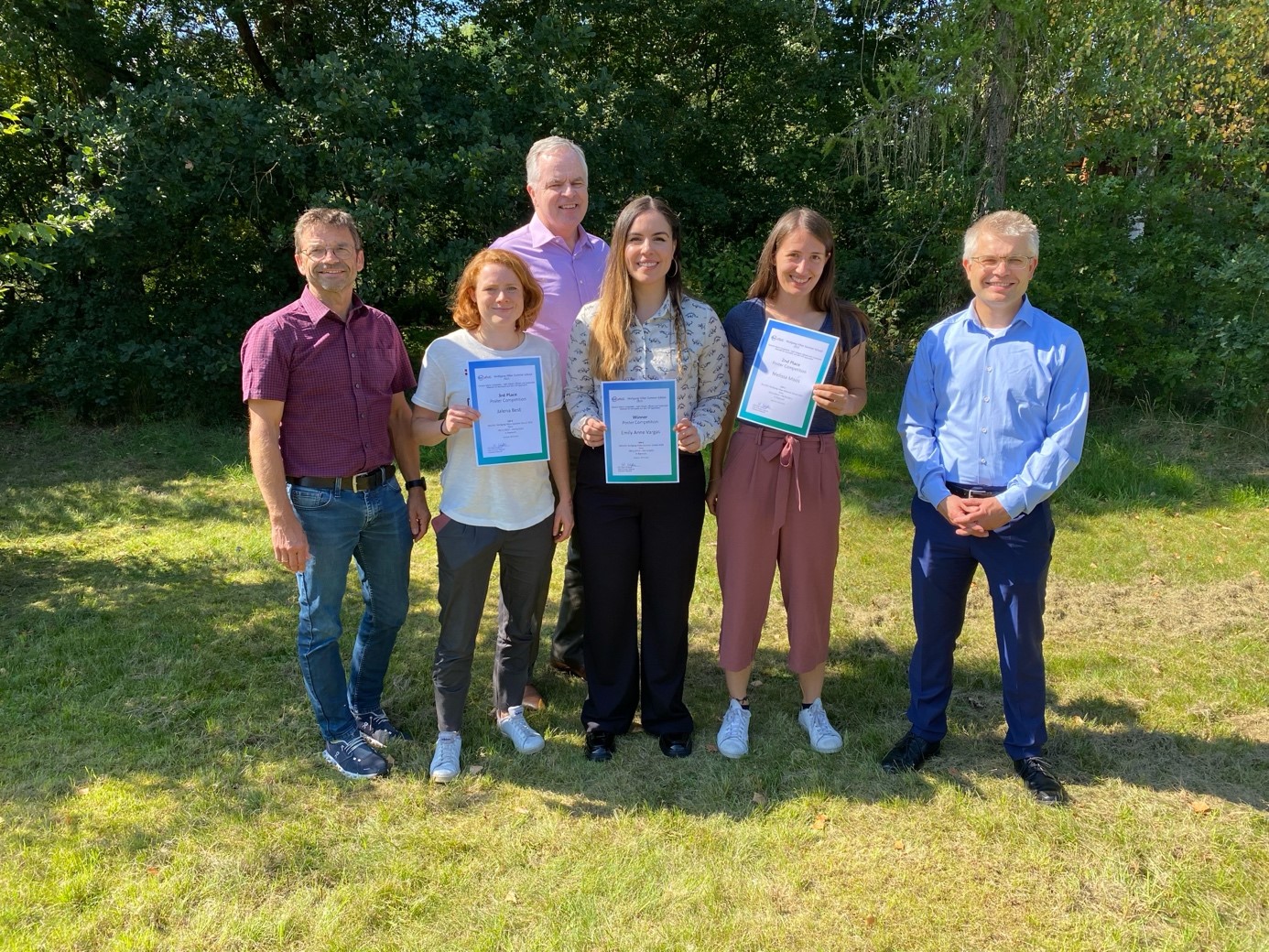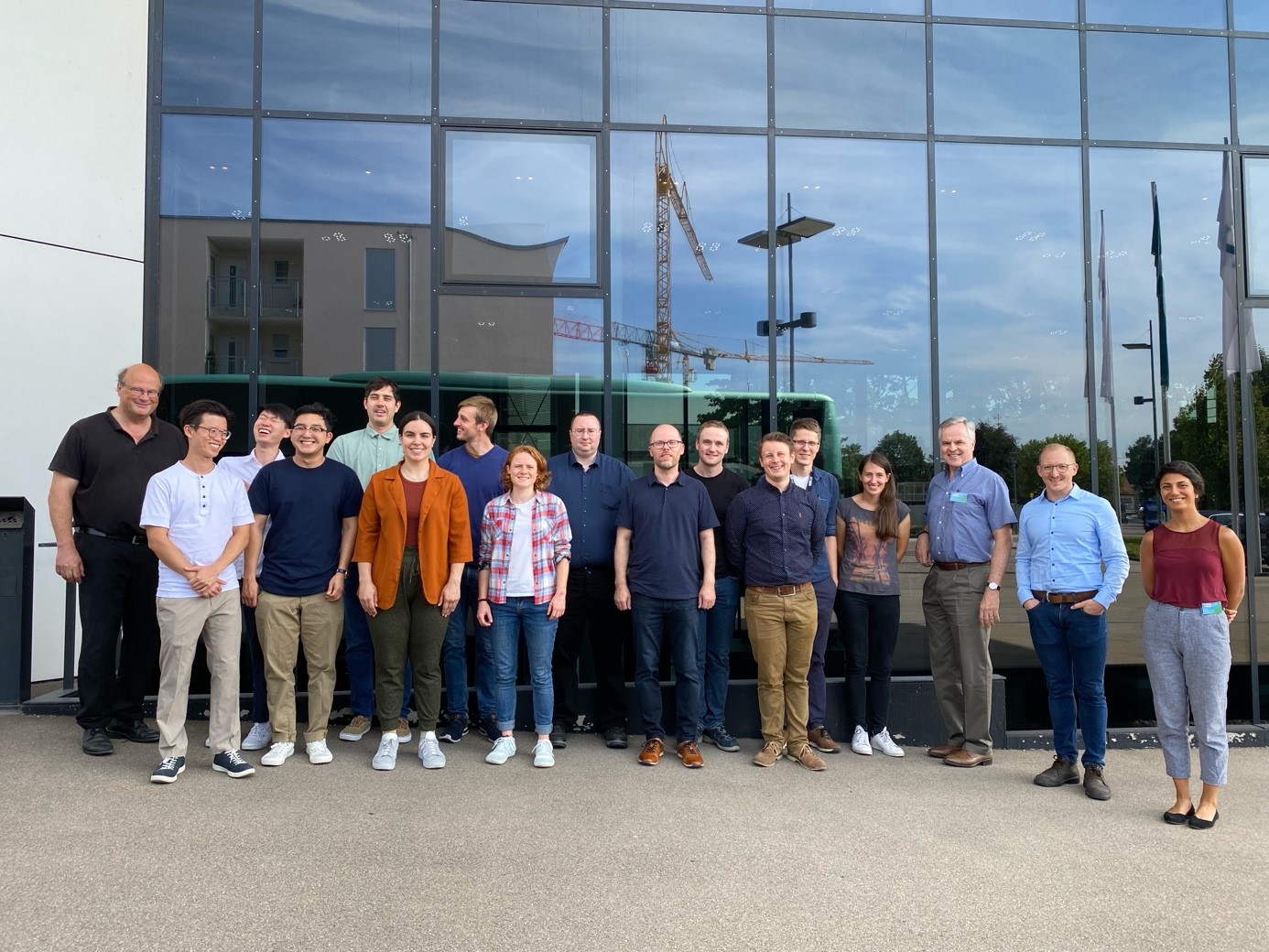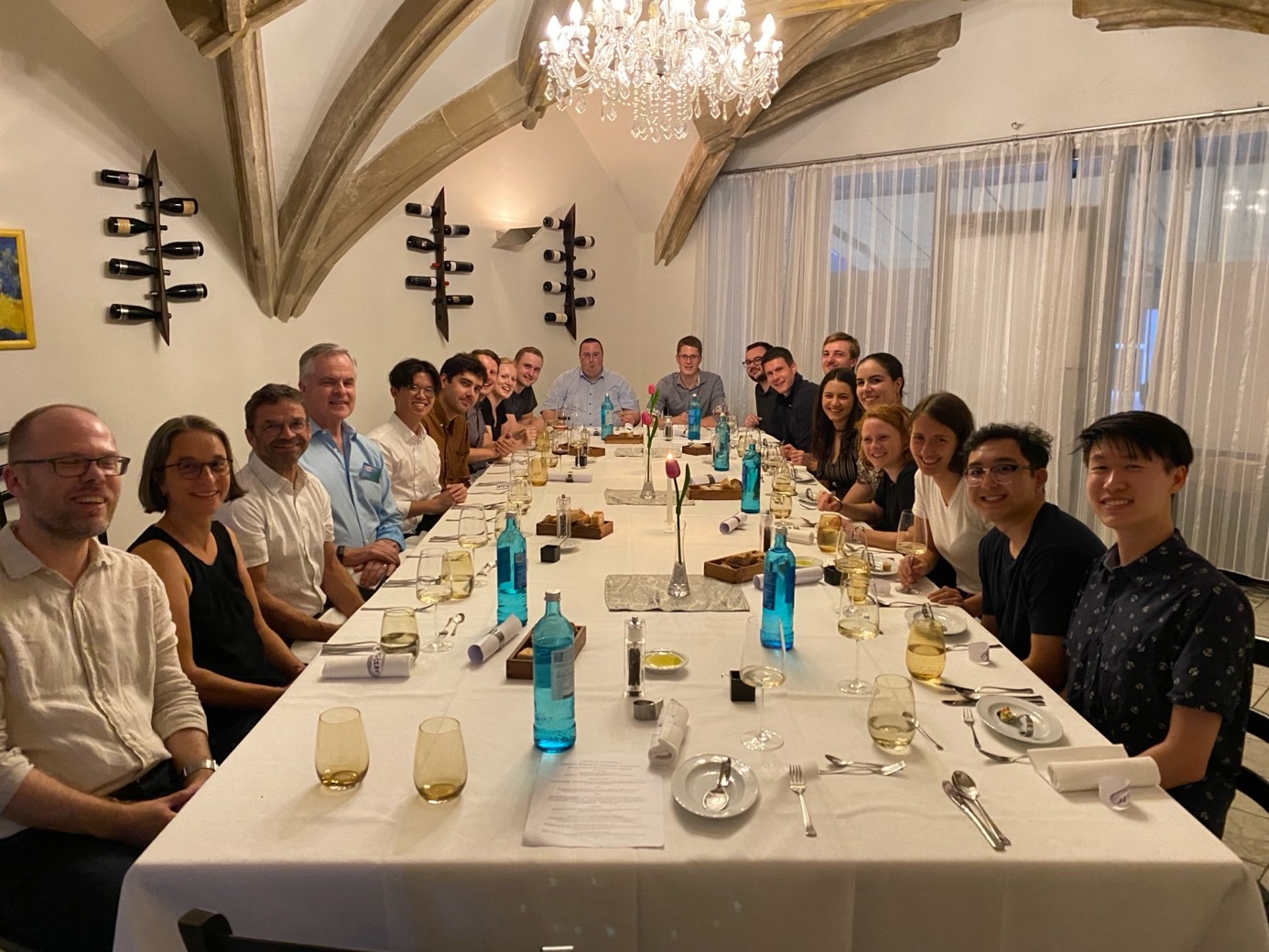Wolfgang Hillen Summer School 2023
Prof. Dr. Stefan Schafföner
University of Bayreuth
Chair of Ceramic Materials Engineering
Prof.-Rüdiger-Bormann-Str.
1
95447 Bayreuth
- Germany
Prof. Dr. Dietmar Koch
University of Augsburg
Chair of Materials Engineering
Am Technologiezentrum 8
86159 Augsburg - Germany
E-Mail: dietmar.koch@mrm.uni-augsburg.de
Prof. Dr. Steven Nutt
University of Southern California
Department of Chemical
Engineering and Materials Science,
3651 Watt Way, VHE 604
Los Angeles, California 90089-0241, U.S.A.
e-mail: nutt@usc.edu
Ceramic Matrix Composites – Light-Weight, Efficient and Sustainable Materials for Aerospace and Spin-Off Applications
September 9th - 16th 2023 – University of Bayreuth
Ceramic Matrix Composites reinforced with ceramic of Al2O3, C, or SiC, exhibit remarkably light weight (2-3 g/cm³, 3-4x less than steel), non-brittle failure (fracture toughness) and damage tolerance, long service life, and resistance to thermal shock, accompanied by high hardness, chemical inertness, and extreme temperature resistance. Thus, most drawbacks of monolithic technical ceramics are overcome. Oxide and non-oxide composite materials (such as C/SiC and SiC/SiC) will play key roles in addressing the future challenges of climate change and requirements to reduce CO2-emissions and airborne particles that comprise fine dust in urban environments (particularly from air and vehicular traffic). Airplane engines contain metallic components (Ni-based superalloys). These superalloys are three-to-four times denser than CMCs. The weight of turbine components can be reduced by more than 50% compared to metallic parts presently used. The superior temperature resistance of CMCs will permit an increase in engine efficiency (up to 65%, compared to ~55% for conventional turbines). Increased efficiency translates to reduced fuel consumption, reductions in CO2 and NOx-emissions (up to 20%), and the amount of cooling air (up to 35%). In the field of CMCs, the USA has been the main driver. In the 2010s, the first series of CMC components were introduced by GE (turbine) and CFM International. Germany must close the technology gap with the US and reach a competency level in aerospace comparable to the production of CMCs for civil applications (spin offs), such as ceramic brake discs used in passenger cars and thermal carrier structures for high temperature processes.
The lectures of the Summer School will start with the components (fibers and matrices), their properties and the fabrication of CMC, including the high temperature processing. An additional part will cover methods and techniques to study these novel and promising materials at room and high temperature. Finally, the costs and important aspects regarding to sustainability and recycling will be covered by the organizers resp. the speaker. During the lectures and practical courses, process-structure and structure-property relationships will be emphasized to help the attendees understand and appreciate the challenges and opportunities of CMC materials. Given this motivation and background, we propose to initiate Summer School 2023, a training program to accelerate awareness and technical competency with CMCs. The 7-day school will provide a theoretical understanding and practical familiarity with CMCs to the participants. Summer School 2023 will also provide opportunities for networking with experts, who will share their experience with students and technical personnel. Lectures by experts from academia and industry will be complemented by a hands-on demonstration. To highlight the course, an excursion is planned to two prominent aerospace companies of Germany resp. Bavaria. Participants will receive a certificate of participation. Parts of the program resp. the lectures will also provide by online tools to extend the reach and to ease the participation if there will be Covid-19-pandemic induced restrictions.
CMC-Summer School 2023 will continue in California in 2024, a plan that will leverage the dynamic growth and anticipated future developments in the region. This plan is based on the settlement of key industrial players of the CMC aerospace industry in California (e.g., Boeing Space and Defense and Rolls Royce). The plan leverages the competences of the University of Southern California and University of California, Santa Barbara.
Further information at: https://www.cme-keramik.uni-bayreuth.de.
Final report
Impressions about the BaCaTec Wolfgang Hillen Summer School 2023 at the University of Bayreuth (Chair of Ceramic Materials Engineering)
On September 9th to 16th 2023 the Wolfgang Hillen BaCaTeC Summer School “Ceramic Matrix Composites – Light-Weight, Efficient and Sustainable Materials for Aerospace and Spin-Off Application” took place in Bayreuth. In total 14 Ph.D. students, 5 post-docs, 3 professors and 5 industry representatives have attended. The Summer School was hosted at the University of Bayreuth by the Chair of Ceramic Materials Engineering. The further attendees were from Los Angeles from the University of Southern California and the regarding M.C. Gill Composites Center and from the Materials Resource Management Department of the University of Augsburg.
On Saturday September 9th all guest from the USC arrived on the airport in Frankfurt and were picked up right on time for the trip to Bayreuth. Just arrived in the hosting city, a group of the Chair of Ceramic Materials Engineering of the University of Bayreuth had prepared a welcome barbecue that kept the American colleagues awake till about 7.30 pm when the arrival day ends in the hotel.
After a short night due to some jet-lag adjustments the Summer School started with very sunny weather and a sightseeing tour all the way through Bayreuth. The Richard-Wagner-Festival-Hall is a very interesting location, worth visiting also for the local people. After this start we spend some time in the still very sunny open air. Like Wilhelmine, the former Margravine of Bayreuth, did 300 years ago, we had a nice walk through the Eremitage park, till lunch time in a typical Bavarian restaurant. Afterwards a tour through the catacombs below Bayreuth started at afternoon and passed over to a nice evening and dinner. During this evening almost all participants of the Summer School have attended and have started to get to know each other.
After this first networking event and welcome reception, the scientific program started on Monday with the keynote talk of Prof. Nutt (University of Southern California) about the manufacturing, application and challenges of CMC and UHT-CMC. The company Axiom from the US presents in another presentation about their high-end Ox/Ox composites and some key developments in this topic. After the lunch in the cafeteria of the University of Bayreuth, three different presentations about special topics (Ox/Ox development, composites repairing strategies & friction applications of CMC) completed the lecture part of Monday. In the evening the PhD students got the possibility to present their work during the Poster session. The poster award winners were Mrs. Emily-Anne Vargas from the University of Southern California, ahead of Mrs. Melissa Moos and Mrs. Jalena Best both from the University of Bayreuth. After the dinner in another appealing Franconian restaurant the participants went back to the hotel.

After this first networking event and welcome reception, the scientific program started on Monday with the keynote talk of Prof. Nutt (University of Southern California) about the manufacturing, application and challenges of CMC and UHT-CMC. The company Axiom from the US presents in another presentation about their high-end Ox/Ox composites and some key developments in this topic. After the lunch in the cafeteria of the University of Bayreuth, three different presentations about special topics (Ox/Ox development, composites repairing strategies & friction applications of CMC) completed the lecture part of Monday. In the evening the PhD students got the possibility to present their work during the Poster session. The poster award winners were Mrs. Emily-Anne Vargas from the University of Southern California, ahead of Mrs. Melissa Moos and Mrs. Jalena Best both from the University of Bayreuth. After the dinner in another appealing Franconian restaurant the participants went back to the hotel.
On Tuesday in the morning the excursion of the Summer School led to Brembo SGL Carbon Ceramic Brakes and MT Aerospace in Meitingen resp. Augsburg. In both companies we got very interesting insights about the manufacturing, development and testing of ceramic brakes and of components for space transporting systems e.g. the Ariane 6, which is on the verge to be introduced in the ESA, right after the Ariane 5 rocket. Full of new impressions and motivated to doing research in the field of Ceramic Matrix Composites all participants came back to Bayreuth in the evening.

After this trip, on Wednesday, the focus was on fundamental properties and innovative fabrication methods by Prof. Schafföner form the University of Bayreuth and the sustainability of CMCs by Prof. Koch of the University of Augsburg. Innovative techniques like the additive manufacturing, the in-situ processing, the fiber-push-out technique and fundamental results about the evaluation of the strength were introduced and discussed. Finally, a talk about the fabrication of polymer derived ceramics showed future processing routes for the fabrication of fibers, matrices and protective coatings. In the evening there was the Summer School dinner at a very nice restaurant in the city center of Bayreuth, were the participants of the Summer School enjoyed this wonderful evening together on one big table.

On the following Thursday four different hands-on courses were in the focus. In the morning different innovative fabrication techniques like the prepreg-processing were demonstrated, studied and discussed. After lunch time the evaluation of the ceramic matrix composites showed that there are a lot of challenges when dealing with materials suitable for temperature above 1,000 °C, no matter if the tests were conducted in the SEM by a nano-indenter or in a universal testing machine under tension.
The final day, Friday, September 15th closed with two keynotes about the state of the art of Ceramic Matrix Composites in Germany, presented by one of the largest CMC companies Schunk Carbon Technology. On the other hand, Dr. Lee (NASA Glenn Research Center) showed the possibilities to protect CMC in harsh environments and gave us some future trends and ideas, that should influence our work significantly. During the last topic of the Summer School, the CMC expert was found within a tricky quiz competition. It all ended, like it started, with a wonderful barbecue in the venue of the TAO-building of the University of Bayreuth.
The Summer School fulfilled all expectations and more. The connection between the USC, the University of Augsburg and especially the University of Bayreuth was initiated and several research topics of common interest identified. Within a parallel BaCaTec project a personal exchange between USC und UBT is scheduled for the end of 2023 and in 2024 another Summer School will most likely be hosted by the USC in Los Angeles.
